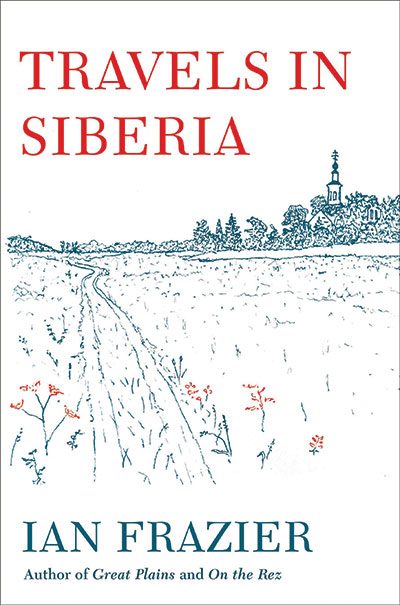
For the past 20 years, New Yorker writer and humorist Ian Frazier has been obsessed with all things Russian, not least the bleak land of Siberia. That passion is evident in his new book, Travels in Siberia (Farrar, Straus and Giroux), a witty, entertaining and thought-provoking travelogue of his visits to those vast, empty spaces. Frazier, 60 and a longtime Montclair resident, visited Siberia five times, traveling with two Russian companions in an old van that broke down religiously. In his book, he vividly recounts the endless roads, camping in the wild along with giant mosquitoes and the characters he meets in the villages and cities of this frozen landscape.
Q: What surprised you most about Russia?
A: Russia is a really funny country, and people have the best, most refined and darkest sense of humor. A 19th-century observer said, “Yes, they’re really funny—because they’re powerless.” It’s a way of coping. It’s the solace of enslaved people, that they make fun of everything because they can’t do anything else. I see how political humor tends to increase in direct ratio to the powerlessness of the people making the jokes. Russia is like slapstick, only you actually die. It’s like, you slip on a banana peel but you don’t get up again. When things are funny there, it’s extreme.
Q: What drew you to Siberia?
A: I was drawn there by the adventure of it, the size of it. I like open country and wilderness, and Siberia has a lot of wilderness. And the fact that lots of other people had crossed it, so you have an arena where you can test yourself against previous record holders. What did they go through? It gives you a sense of how tough they were, what it was like to be a 19th-century traveler there. It’s like you become a member of a group of people who are not only of your time.
Q: How did your perception of Siberia change after you’d been there?
A: I saw that if you were someone who wanted to live in Siberia, it wasn’t a lot different from living in a very remote part of our country. There are people who are happy there, who have a good setup, who have a garden and a nice house. They like living out in remote places. The population of Siberia is about 38 million and it’s on one-twelfth of the land on Earth.
Q: In your book, you visit an abandoned Stalinist prison camp, as well as war memorials. How did the brutal history of Russia affect you?
A: Russia is so dark, the darkness of that place is really impossible to grasp. Russian nightmares are scarier. I don’t know why it is, but there’s a demonic quality to them. Russians have a real familiarity with horrible, wicked demons.
Q: What did that brutality do to the Russian people?
A: I think Americans have an optimism and a can-do quality and a belief that things can be fixed. Americans smile; Russians do not smile. When you come up to a Russian, smiling, they will look at you and say, “Why are you doing that?” There is an acknowledgement of darkness and a heaviness that we just don’t have in America.
Q: Were you surprised when Russian spies were arrested last summer in Montclair, your hometown?
When I traveled to Russia—before the spy story broke—I told people I met that I was from Montclair. It just seems coincidental to me that there would be Russian spies here. I wonder if someone over there picked up on it—what’s this Montclair this guy’s talking about? And I wonder, why did the spies pick Montclair? It’s amazing to me; one day, I see this woman riding the number 66 bus in Montclair, and the next Friday she’s linking arms with Putin and singing patriotic songs about the Russian spy service.
